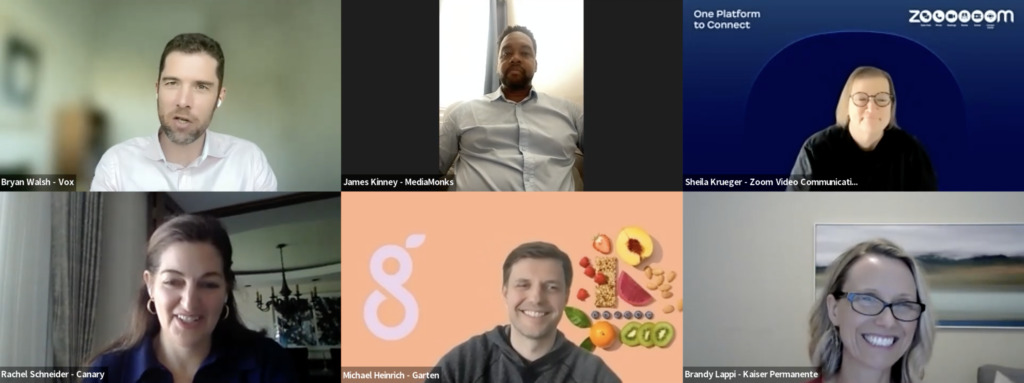This panel recap was written by Emily McCrary-Ruiz-Esparza and appeared on fromdayone.co on September 30, 2022.

Workers have come to expect employers to provide crisis support in the way of mental health care, flexible schedules, financial assistance, and backup childcare. As we emerge from the worst of the Covid-19 crisis and see new uncertainties ahead, including an economic downturn, the workforce is expecting companies not just to meet workers in the next crisis, but help them prepare for it.
“Sixty-eight percent of employees and 81% of the C-suite say that improving their well-being is more important than advancing their career. Maybe five years ago, that wouldn’t have been the case,” said Michael Heinrich, citing figures published by Deloitte in 2022. Heinrich is the founder and CEO of Garten, a company that stocks workplaces with healthy foods.
“Companies have a large role in supporting the mental health of their workers. In fact, times have shifted, and workers expect this type of support from their employers,” said Brandy Lappi, director of workforce health and employer onsite services at the health care system Kaiser Permanente. “Companies can start by providing resources that foster a psychologically healthy work environment.”
Heinrich and Lappi were a part of a conversation on how employers can prepare workforces for the next crisis, moderated by Vox’s Future Perfect editor Bryan Walsh, part of From Day One’s September virtual conference on “Stress, Anxiety and the Modern Company’s Role in Promoting Well-being.” Key advice from the five expert speakers on the panel:
Train Managers to Care for Employees’ Mental Health
Step one: Train people managers on mental health best practices. Mentally healthy employees are resilient employees, they said. “Get your managers general mental health and well-being training,” Lappi said. “You can do this by partnering with your employee assistance program [EAP]. If you don’t have an employee assistance program that can bring this training to your managers, partner with your health plan, they might be able to help.”
Distribute the workload, said Lappi. Employers’ expectations of managers are getting bigger, and it’s easy to overload them with the responsibility of protecting their employees’ mental health. Once managers are trained, get non-managerial staff involved.
“We establish wellness ambassadors so that all of the knowledge doesn’t stay in one person. We empower a broad network of other employees to be able to take that baton and help their fellow employees.” Lappi has found that an employee in crisis may be more likely to ask their colleague for help than a manager. In some cases, they may be more candid with a peer than a superior. “By distributing that work responsibility, it empowers the entire workforce,” she said.
Set Expectations for Self-Care
Heinrich encouraged employers to set new workplace expectations for taking care of oneself. Garten backs three pillars of health: mind, body, and environment. Heinrich said he inherited those values from his grandmother, a physician in his childhood hometown of Berlin. “Her message to me was very simple: Eat from my organic garden, go to bed on time, exercise regularly, and have a good friendship circle,” he said.
In the service of the three pillars, Garten reimburses its employees for activities like transcendental-meditation coaching, gives Fridays off to pursue well-being activities, and offers plenty of flexible time during the workday to get out and take walks, meditate, or “whatever it is that you choose,” Heinrich said. The company gives well-being bonuses to employees who participate. “Your job is to exercise, sleep well, meditate, eat well, because you show up in a specific way.”
Digital marketing firm Media.Monks has turned its offices into “hubs,” where employees can get work done and get enrichment programming that reinforces well-being of all kinds, like “learning how to buy your first home, learning how to eat better, learning how to meditate, or get some coaching,” said James Kinney, the company’s global chief diversity officer.
Media.Monks is rolling out a bicycle program at all of its office locations that encourages people to bike to work. The agency’s programs double as a means to attract workers back to the office. “We call them hubs versus offices, [and they] give people a reason to come into the office.”
Make a Menu of Your Benefits
To prepare the labor force for the next crisis, employers should plan with specific needs in mind, but solutions to specific problems–like financial crises, for example–shouldn’t be prescribed before the contours of the situation are known. Instead, make a menu employees can pick from. In the case of financial crises, this menu might include emergency relief funds, financial-counseling services, and earned-wage access.
“People’s situations are so variable, so if you start going down that personalization road, then you really need a lot of options. The danger is that you’re increasing complexity for the person on the other end, having to navigate, ‘Which of these things benefit me, and how do I access them?’” said Rachel Schneider, the founder and CEO of Canary, a company that manages emergency relief funds for workers.
The same is true for mental health benefits. “Mental health is not cut-and-dried, but on a continuum,” said Lappi. “Companies can support their workforces by making sure employees have access to a wide range of resources, from self-care tools to short-term interventions to specialty care for people who have mental health conditions or substance-abuse disorders.”
Keep the ultimate objective in mind, said Kinney. “There are so many different ways that we could slice this cake. It’s about honoring, respecting, and supporting those nuances.”
Set Up 24/7 Access to Crisis-Support Benefits
Employers can prepare their workforces for the next crisis by documenting available benefits and making them easy to access anytime, anywhere. Employees should be able to opt for help as needed, said Sheila Krueger, head of global benefits at Zoom Video Communications. Let people know “not just what you have, but how they can access that information around the clock as well.” Krueger called it “self-serve.”
She recommended two types of support: a point person available during work hours to answer questions about benefits and 24-hour digital access to help with instructions on how to use it. “I come from an era where customer service and that personal touch is really, really important, so even though it sometimes pains me to not be able to answer every question through chat, it’s nice to make sure that we’re building out a knowledge base for people so they can get the information whenever they need it,” Krueger said.
Zoom built a tool that “allows our employees to have 24/7 access to live coaches on a myriad of topics. It goes all the way from financial wellness and mental wellness to physical wellness,” she said.
All-hours access with instructions on independent use is another way to avoid prescriptive engagement, Canary’s Schneider said. “How do you locate the control and the choice and the trust in the individual who’s receiving the benefit? It’s great for us to say, ‘We think everybody should exercise, we think everybody should eat right, we think everybody should get a lot of sleep.’ But people have different life constraints, and they’ll each make different choices around that. That has to be okay, too,” she said. “We provide guide rails for what we think is useful for each other and we know that there’s variation within that.”
“The key is trying to make life as simple as possible in very complicated times,” Krueger added.
Create a Community That Can Weather the Next Crisis Together
Crisis support is best delivered through community. According to a paper written by psychologists at Nottingham Trent University in England, “The role of communities in providing social and psychological resources to residents is well-established in social psychology. The Social Identity Approach to Health demonstrates that a range of physical and mental health outcomes result from identification with social groups, constituting a ‘social cure.’ … These community relationships are also critical during disasters because they motivate cohesive, prosocial responses and coalesce around a sense of solidarity and support.”
Kaiser Permanente’s wellness ambassadors, community-based programming at Media.Monks, human support for crisis benefits at Zoom—these are community supports put in place ahead of the next crisis. For Schneider, emergency-relief funds represent “a really important way to send a message that we’re a community, we’re all in it together, and we have each other’s backs.”
That’s how employers can cultivate resilience, said Kinney. “From a resilience framework perspective, when you allow individuals to have a contribution towards a solution that’s bigger than themselves, we find that engagement is higher and that communities are the keys to solutions.”






